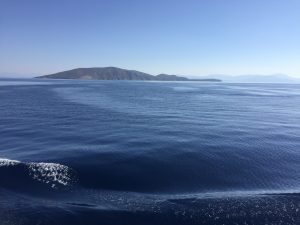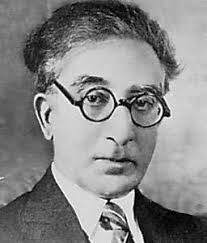
Poetry is an expression of feelings, imagination, thoughts, experiences and knowledge that a person acquires. The difference between one poet and another is the way in which this is expressed, through the images that arise with the use of words and the metaphors that are used. The reader’s senses come alive and he is able to conjure up a picture of what is being described by the poet.
Each poet expresses his thoughts in his own way and the strength of his poem leaves its mark. One such poet is Constantine Cavafis, the Greek-Egyptian poet who is not only well-known in Greece, but worldwide as his poems have been translated not only into English, but in many other languages as well.
Constantine Cavafis was born in 1863 in Alexandria, Egypt. He was the youngest of seven siblings. He came from an affluent family as his father, who held duel citizenship (Greek and British), was a merchant and landowner and had offices in Liverpool, London, Constantinople and later in Alexandria. His mother came from Constantinople where her father was a gem merchant.
When his father died in 1870, his mother took the children to Liverpool and then London for about seven years between 1872 and 1879, before returning to Alexandria. When the Anglo-Egyptian War broke out in 1882, they went to stay with his mother’s family in Constantinople. Cavafy was 19 at that time. After the war, the family returned to Alexandria where they had to start from scratch as their house had been completely destroyed and the family business was declining.
Cavafy, in order to have a steady income, began work in the Ministry of Public Works as a clerk while at the same time writing his articles and poems. He never published his poems in book form although he had offers from both a Greek and English publisher. He preferred to publish them in newspapers and periodicals and printed them himself in broadsheets, which he gave to anyone interested in reading his poems.
In 1926, the Greek State honoured Cavafy for his contribution to Greek letters by awarding him the Silver medal of the Order of Phoenix. He founded the magazine ‘Alexandrian Art’ where he published his articles and poems.
In 1932 he was diagnosed with cancer in the larynx (he was a life-long smoker). He travelled to Athens for more advanced treatment, which was however ineffectual. He returned to Alexandria where he died a few months later in the Greek hospital. He said of the area where he lived, “Where could I live better? Under me is a house of ill-repute, which caters to the needs of the flesh. Over 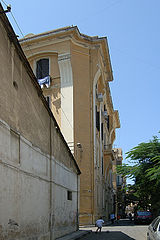 there is the church, where sins are forgiven. And beyond is the hospital, where we die.”
there is the church, where sins are forgiven. And beyond is the hospital, where we die.”
His apartment has been turned into a museum. Several sketches by Cavafy as well as original manuscripts, pictures and portraits are on display.
His poems helped in the recognition of modern Greek poetry both in Greece and abroad. He drew his topics from personal experience as well as history, especially that of the Hellenistic period (the era between the death of Alexander the Great in 323 BC and the emergence of the Roman Empire).
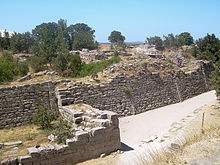
His poem ‘Ithaca’ is one of his best known poems. It was written in 1911 and was inspired by Homer’s description of Odysseus’ return journey to his homeland, the island of Ithaca, which he was king of. It is a poem that we often refer to when we want to talk about the ideals of what life has to offer and what a person’s aims should be.
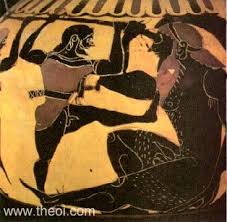
After the destruction of Troy and at the beginning of his voyage to his island kingdom of Ithaca, Odysseus killed the one-eyed Cyclops, Polyphemos, son of Poseidon, and thus incurred the sea god’s wrath. Later, the Laestrygone, giant cannibals, destroyed eleven of Odysseus’s twelve ships. Almost twenty years after he had left to fight at Troy, and almost ten years of adventures on the way, Odysseus finally reached Ithaca.
The poem’s theme is the enjoyment of the journey of life and the increasing maturity of the person as the journey continues. Life is a journey of difficulties that have to be overcome, just as Odysseus overcame his. By the time a person reaches his Ithaca, he has gained so many experiences that would not have been possible otherwise. Therefore, the important thing is the journey and not the goal.
The life of Cavafy was made into a film by Yiannis Smaragdis in 1997.
ITHACA
When you set out on the voyage to Ithaca,
pray that your journey may be long,
full of adventures, full of knowledge.
Of the Laestrygones and the Cyclopes
and of furious Poseidon, do not be afraid,
for such on your journey you shall never meet
if your thought remains lofty, if a select
emotion imbues your spirit and your body.
The Laestrygones and the Cyclopes
and furious Poseidon you will never meet
unless you drag them with you in your soul,
unless your soul raises them up before you.
Pray that your journey may be long,
that many may those summer mornings be
when with what pleasure, what untold delight
you enter harbors you’ve not seen before;
that you stop at Phoenician market places
to procure the goodly merchandise,
mother of pearl and coral, amber and ebony,
and voluptuous perfumes of every kind,
as lavish an amount of voluptuous perfumes as you can;
that you venture on to many Egyptian cities
to learn and yet again to learn from the sages.
But you must always keep Ithaca in mind.
The arrival there is your predestination.
Yet do not by any means hasten your voyage.
Let it best endure for many years,
until grown old at length you anchor at your island
rich with all you have acquired on the way.
You never hoped that Ithaca would give you riches.
Ithaca has given you the lovely voyage.
Without her you would not have ventured on the way.
She has nothing more to give you now.
Poor though you may find her, Ithaca has not deceived you.
Now that you have become so wise, so full of experience,
you will have understood the meaning of an Ithaca.
